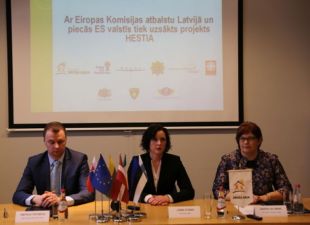EU – Baltic States, Forum, Latvia, Legislation, Society
International Internet Magazine. Baltic States news & analytics
Sunday, 06.07.2025, 01:49
Activities of HESTIA Project presented in Belgium and France
 Print version
Print version |
|---|
Mr Dimitrijs Trofimovs, Deputy State Secretary, Director of Sectoral Policy Department of the Ministry of the Interior on behalf of the Latvian Presidency addressed participants of the meeting informing that elimination of trafficking in human beings is defined as a priority of European Security Agenda to combat organised crime. He highlighted that tackling the growing problem of sham marriages is important to the Latvian Presidency and it is has therefore been selected as one of the main themes of the meeting.
Ms Vija Buša, Counsellor of the Embassy of the Republic of Latvia in Dublin, Ireland provided presentation on the problem of sham marriages and links to trafficking in human beings.
Ms Lāsma Stabiņa, Senior Desk Officer of Sectoral Policy Department of the Ministry of the Interior, a Manager of Project HESTIA* presented the project and informed about initial findings from the project. She informed that if the project research currently carried out provides the arguments based evidences Latvia is ready to initiate discussions on the EU level to amend the EU Directive 2011/36/EU defining sham marriages as a form of trafficking in human beings.
Mr Trofimovs expressed the hope that the results of international project HESTIA led by the Latvian Ministry of the Interior will provide the basis for new political or legal initiatives to combat trafficking in human beings.
On 15-16 June 2015 in Strasbourg, France the 16th meeting of the Committee of the Parties of the Council of Europe Convention on Action against Trafficking in Human Beings and the conference organised to mark the 10th anniversary of the opening for signature of the Council of Europe Convention on Action against Trafficking in Human Beings were held.
Ms Lāsma Stabiņa as a Contact Person to liaise with GRETA providing comments on Report submitted by the Latvian authorities on measures taken to comply with Committee of the Parties Recommendation on implementation of the Council of Europe Convention on Action against Trafficking in Human Beings by Latvia informed that GRETA Report concerning the implementation of the Council of Europe Convention on Action against Trafficking in Human Beings by Latvia (first evaluation round) was used as a background document to elaborate a new policy planning document “National Strategy for Prevention of Trafficking in Human Beings 2014 – 2020” which was approved by the Latvian Government in the beginning of the year 2014. Since adoption of Committee of the Parties Recommendation in 15 February 2013 various anti-trafficking measures and activities have been implemented achieving important improvements in awareness raising, provision of support, assistance and protection services for victims of trafficking in human beings as well as investigation and prosecution of trafficking in human beings cases. She highlighted that situation and trends of trafficking in human beings are changing and become more complicated to identify and investigate and the Latvian Government acknowledges that there are a lot of to do to prevent and combat trafficking in human beings.
The Latvian Government identifies new challenges which demand innovative approaches and solutions particularly when it comes to the issue on shame marriages and trafficking in human beings. She informed about the HESTIA Project and its initial results discussed by project partners from Latvia, Lithuania, Estonia, Slovak Republic, Finland and Ireland during the project’s coordination meeting in Dublin, Ireland in the beginning of June.
Mr Mick Quinn from the Department of Justice and Equality of Ireland informed that shared understanding is only ever going to happen when we have a full picture on what happens and that can happen when it is seen from both sides – from source countries and destination countries. HESTIA Project research will be a useful tool to provide shared picture to develop shared understanding.
The HESTIA Project was presented at GENVAL (Working Party on General Matters, including Evaluations) on 24 June 2015 in Brussels, Belgium higlighting that EU Member States have responsibility for identification of victims of trafficking in human beings and provision of support, assistance and protection for them. “Consequently there is no reason to excuse that this phenomenon is not clear enough and such cases of trafficking in human beings are complicated to recognize and investigate” Ms L.Stabiņa said.
*Project "Preventing human trafficking and sham marriages: A multidisciplinary solution" (HESTIA) is being implemented by Directorate General of Home finance of European Commission (EC) "Prevention of and Fight against Crime Programme". Grant Agreement Nr. HOME/2013/ISEC/AG/THB/4000005845.
HESTIA project partners: Ministry of the Interior (Latvia), NGO "Shelter “Safe House"" (Latvia), NGO "Mittetulundusühing"" "Living for Tomorrow" (Estonia); NGO "Caritas Lithuania" Immigrant Council of Ireland (Ireland); Ministry of the Interior of Slovak Republic (Slovakia); European Institute for Crime Prevention and Control of the United Nations (HEUNI) (Finland).
Within the framework of the project during two years a variety of activities are provided: by the organization of discussions of legislators, policy planners and practitioners at national and regional level in each country a comprehensive research of the problem of sham marriages will be prepared; learning methodology will be developed and training will be implemented during which social workers, social educators, workers of educational institutions, media representatives, state and municipal police officers and representatives of non-governmental organizations will be educated; awareness raising campaigns and final conference of the project will be implemented. Overall, during the activities of the project it is planned to involve and address more than 700 thousand members of the society in six European Union (EU) countries. HESTIA project was launched on 1 January 2015 and will last 24 months.








 «The Baltic Course» Is Sold and Stays in Business!
«The Baltic Course» Is Sold and Stays in Business!

